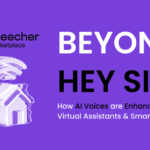The world of technology is rapidly evolving, and one area that has seen significant advancements is voice cloning. This groundbreaking technology allows for the replication of a person’s voice, creating synthetic audio that is virtually indistinguishable from the original. From entertainment to business, voice cloning has the potential to revolutionize countless industries.
However, as with any powerful technology, voice cloning also raises ethical concerns. The ability to manipulate voices could be used for malicious purposes, such as spreading misinformation or impersonating individuals. It is crucial to develop ethical guidelines and regulations to ensure that this technology is used responsibly.
My Proven Way to Make $100-$200 Per Day With 0 Investment – Watch THIS FREE Video to START >>

Current Applications of Voice Cloning Technology
Voice cloning technology is already making waves in various industries, offering innovative solutions and enhancing user experiences. One prominent application is in the entertainment sector. In movies, voice cloning can be used to recreate the voices of deceased actors or to create entirely new characters. For instance, the recent use of voice cloning to recreate the voice of Anthony Bourdain for a documentary showcased its potential to bring back the voices of the past.
In the realm of video games, voice cloning allows for more immersive and personalized experiences. Gamers can interact with characters that speak in their own unique voices, creating a deeper connection to the game world. Additionally, voice cloning can be used to create realistic dialogue options, enabling players to feel as though they are truly participating in the story.
Dubbing, the process of translating and adapting foreign films or TV shows into a different language, has also been transformed by voice cloning. By using voice cloning technology, producers can ensure that the dubbed voices closely match the original actors’ tones and accents, providing a more authentic viewing experience.
Beyond entertainment, voice cloning is finding applications in customer service. Virtual assistants and chatbots powered by voice cloning technology can provide more natural and engaging interactions with customers. These AI-driven systems can understand and respond to complex queries, offering personalized assistance and improving overall customer satisfaction.
In the field of education, voice cloning has the potential to revolutionize personalized tutoring. By creating virtual tutors that speak in the voices of experts, students can receive one-on-one instruction tailored to their individual needs. This can be particularly beneficial for learners who struggle with traditional classroom settings or who require specialized attention.
Moreover, voice cloning can be used to develop language learning tools that provide immersive experiences. By listening to native speakers, learners can improve their pronunciation and accent, gaining confidence in their language skills.
Ethical Concerns and Challenges
While voice cloning offers numerous benefits, it also raises significant ethical concerns and challenges. One major concern is the potential for malicious use, particularly in the creation of deepfakes. Deepfakes are synthetic media, such as videos or audio recordings, that are designed to deceive viewers by making it appear as if real people are saying or doing things they never did. Voice cloning technology can be used to create deepfake audio recordings, which can be used to spread misinformation, manipulate public opinion, or even frame innocent individuals.
Another ethical consideration is the collection and use of voice data. To train voice cloning models, large amounts of voice data are required. This raises questions about privacy and consent. How much voice data should be collected? Who owns the rights to this data? And what measures should be in place to protect individuals’ privacy?
Copyright and intellectual property laws also pose challenges for voice cloning technology. When a person’s voice is cloned, does the clone become the property of the creator? Or does the original owner retain rights to their voice? These legal questions are complex and have yet to be fully resolved.
In addition to these ethical and legal concerns, there are also technological limitations to voice cloning. While significant progress has been made, creating natural-sounding and accurate voice clones remains challenging. Factors such as the quality of the training data, the complexity of the voice, and the limitations of current algorithms can affect the quality of the cloned voice. Overcoming these technological hurdles is essential for the widespread adoption and acceptance of voice cloning technology.
My Proven Way to Make $100-$200 Per Day With 0 Investment – Watch THIS FREE Video to START >>
Future Advancements and Innovations
Despite current limitations, the future of voice cloning technology is promising, with significant advancements on the horizon. One area of focus is improving the realism and naturalness of cloned voices. As AI and machine learning algorithms continue to evolve, we can expect to see more sophisticated models capable of capturing the nuances of human speech, including subtle variations in pitch, tone, and rhythm.
Another exciting development is the pursuit of real-time voice cloning. Currently, creating a cloned voice can be a time-consuming process. However, advancements in hardware and software are making it possible to achieve faster processing times, enabling real-time applications. This could have significant implications for various industries, such as live broadcasting, telecommunications, and gaming.
Beyond English-language voice cloning, researchers are exploring the capabilities of multi-lingual voice cloning. By training models on diverse datasets, it is possible to create voice clones that can mimic voices in multiple languages. This could facilitate global communication and break down language barriers.
Finally, the ability to replicate various emotional states is another area of ongoing research. By analyzing the emotional content of speech, researchers are working to develop voice cloning models that can convey different emotions, such as happiness, sadness, anger, or surprise. This could enhance the expressiveness of synthesized voices, making them more engaging and relatable.
Potential Industries and Applications
Voice cloning technology has the potential to transform a wide range of industries, offering innovative solutions and enhancing user experiences. In the healthcare sector, personalized medical advice and mental health support can be provided through voice-enabled systems. Patients can receive tailored guidance from virtual doctors or therapists, improving access to care and reducing the stigma associated with mental health issues.
Marketing and advertising can also benefit from voice cloning technology. Targeted campaigns can be delivered to specific demographics using personalized voices, increasing engagement and effectiveness. Additionally, voice-enabled assistants can provide personalized recommendations based on individual preferences, enhancing the customer experience.
The gaming industry is another area where voice cloning can have a significant impact. By creating immersive experiences with realistic character voices, developers can enhance the storytelling and gameplay, making games more engaging and memorable. Voice cloning can also be used to personalize character interactions, allowing players to feel more connected to the virtual world.
In the automotive industry, voice-controlled systems are becoming increasingly common. Voice cloning technology can be used to create more natural and intuitive interactions with these systems, making driving safer and more enjoyable. For example, drivers can control various functions, such as navigation, music, and phone calls, using their own voice, reducing distractions and improving safety.
Regulatory Landscape and Policy Implications
As voice cloning technology continues to advance, it is essential to establish a robust regulatory framework to address potential risks and ensure responsible use. Global regulations are emerging to govern the development and application of this technology. These regulations may include guidelines on data privacy, consent, and the prevention of misuse.
In addition to government regulations, industry self-regulation can play a vital role in promoting ethical practices. Voluntary codes of conduct and ethical guidelines can be developed by industry leaders to establish standards for responsible use of voice cloning technology. These codes can address issues such as data privacy, transparency, and accountability.
International cooperation is also crucial in addressing the global challenges posed by voice cloning technology. By working together, countries can develop common standards, share best practices, and address cross-border issues. International organizations can play a key role in facilitating cooperation and promoting responsible use of voice cloning technology.
My Proven Way to Make $100-$200 Per Day With 0 Investment – Watch THIS FREE Video to START >>
Conclusion
Voice cloning technology is a rapidly evolving field with the potential to revolutionize various industries. From entertainment to healthcare, this technology offers innovative solutions and enhances user experiences. However, it is essential to address the ethical concerns and challenges associated with voice cloning, such as the risk of misuse, privacy concerns, and legal implications.
By developing robust regulations, promoting industry self-regulation, and fostering international cooperation, we can ensure that voice cloning technology is used responsibly and for the benefit of society. As this technology continues to advance, it is crucial to strike a balance between innovation and ethical considerations, safeguarding the privacy and rights of individuals while harnessing the potential of voice cloning for positive outcomes.









